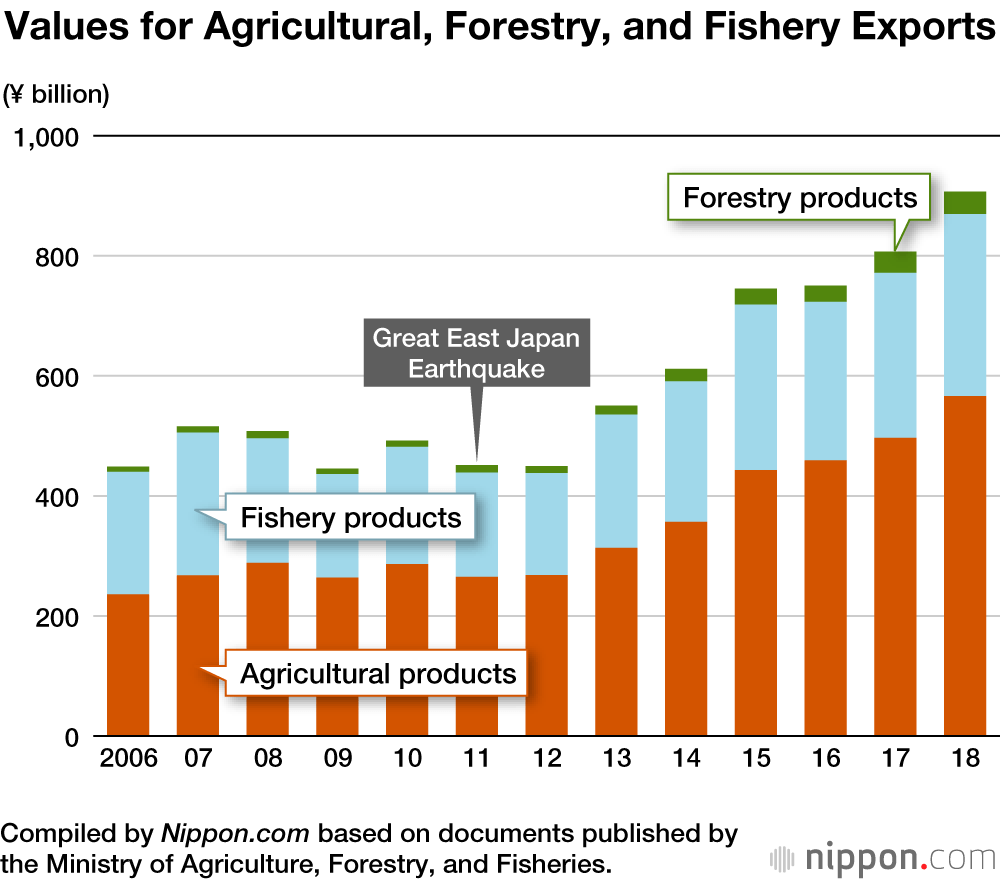
Beefing Up Japan’s Food and Drink Exports
Economy- English
- 日本語
- 简体字
- 繁體字
- Français
- Español
- العربية
- Русский
Preliminary figures for agricultural, forestry, and fishery exports in 2018 show an increase of 12.4% from 2017 to a new record high of ¥906.8 billion. This is more than twice the ¥451.1 billion recorded in 2011, the year of the Great East Japan Earthquake. With the Trans-Pacific Partnership and the Japan-EU Economic Partnership Agreement coming into effect, the government goal of achieving ¥1 trillion in 2019 looks set to become a reality.
Beef exports rose by 29.1% from 2017 to ¥24.73 billion, driven by the popularity of Kobe beef and other wagyū beef brands. International interest and appreciation are growing for Japanese cuisine, fueling demand for characteristic products like sake and green tea.
Japanese fruits are also winning fans for their delicate taste and flawless appearance. Exports of apples rose by 27.6% from 2017 to ¥13.97 billion. At ¥2.5 billion, strawberry exports are still relatively low-volume, but this was actually a huge 40.7% increase from 2017. Famous strawberry brands such as Amaou are particularly well known in Asia. Mackerel, popular in the African market, saw an increase of 22.0% to ¥26.69 billion.
Major Agricultural, Forestry, and Fishery Exports from Japan in 2018
| Items | Amount (¥ billion) | Year-on-Year Increase |
|---|---|---|
| Scallops (fresh, chilled, frozen) | 47.68 | 3.1% |
| Sauces, seasonings, etc. | 32.54 | 10.0% |
| Sake | 22.23 | 19.0% |
| Soft drinks | 28.17 | 15.0% |
| Beef | 24.73 | 29.1% |
| Apples | 13.97 | 27.6% |
| Green tea | 15.33 | 6.8% |
| Mackerel | 26.69 | 22.0% |
| Bonito/tuna | 17.95 | 25.8% |
Compiled by Nippon.com based on documents published by the Ministry of Agriculture, Forestry, and Fisheries.
Hong Kong was the top export destination with a value of ¥211.5 billion, an increase of 12.7% from 2017. It was followed by China, the United States, Taiwan, and South Korea.
An outstanding issue is that 24 countries and regions as of January 15, 2019 still have import restrictions on food products from Fukushima Prefecture, due to the 2011 Fukushima Daiichi Nuclear Power Plant disaster. In particular, China, Hong Kong, Taiwan, and Macao have halted the import of a wide range of products from that region. In January 2019, Fukushima Prefecture Governor Uchibori Masao visited Hong Kong to talk about the strict radiation inspections that are conducted and to promote the safety of the prefecture’s products.
(Translated from Japanese. Banner photo © Pixta.)

